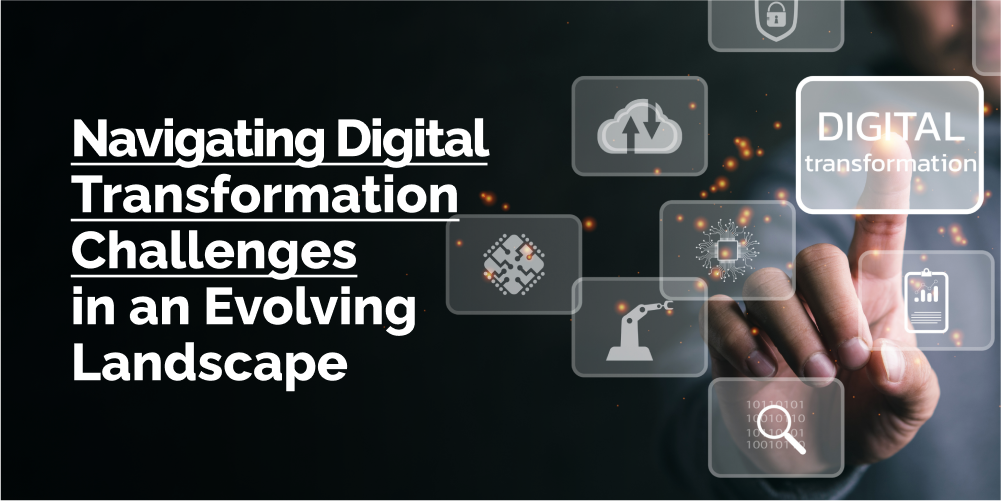Digital Transformation, zBlog
Digital Transformation Challenges in 2025: Navigating the Evolving Landscape

In today’s rapidly evolving digital landscape, organizations across all industries are faced with the imperative to embrace digital transformation or risk being left behind. As we approach 2025, the pace of technological change shows no signs of slowing down, and the challenges associated with digital transformation continue to evolve, presenting new hurdles for businesses to overcome.
Digital transformation is no longer a mere buzzword or a fleeting trend; it is a fundamental requirement for organizations to remain competitive, agile, and customer-centric. However, the path to successful digital transformation is often fraught with obstacles, ranging from cultural resistance and legacy system integration to data privacy and cybersecurity concerns. In this comprehensive blog, we will explore the critical digital transformation challenges that organizations are likely to encounter in 2025 and provide insights into how to navigate these hurdles effectively.
Overcoming Cultural Resistance and Fostering an Adaptive Mindset

Overcoming cultural resistance within the organization is one of the most significant digital transformation challenges. Transforming entrenched processes, mindsets, and ways of working can be a daunting task, as it often faces resistance from employees who are comfortable with the status quo or fear the uncertainties that come with change.
In 2025, organizations will need to double down on their efforts to cultivate a culture that embraces change, encourages innovation, and empowers employees to adopt a growth mindset. This necessitates strong leadership commitment, effective communication strategies, and ongoing training and upskilling initiatives.
Leaders must articulate a compelling vision for digital transformation and engage employees at all levels, fostering a sense of ownership and shared responsibility. Creating an environment that celebrates small wins, learns from failures, and encourages experimentation will be crucial in breaking down cultural barriers and fostering an adaptive mindset.
Navigating the Complexity of Legacy System Integration

Many organizations find themselves encumbered by legacy systems and outdated technology stacks that hinder their ability to innovate and adapt to rapidly changing market demands. Integrating these legacy systems with modern digital solutions is a significant challenge that organizations will continue to grapple with in 2025.
Achieving seamless integration between legacy systems and new technologies is essential for ensuring data consistency, streamlining processes, and delivering a seamless user experience. However, this endeavor often requires substantial resources, expertise, and careful planning to mitigate risks and minimize disruptions to existing operations.
In 2025, organizations will need to prioritize investments in robust integration strategies, such as adopting microservices architectures, leveraging APIs, and implementing cloud-based solutions that can facilitate the gradual modernization of their technology landscapes. Effective change management and a phased approach to system integration will be crucial to minimizing downtime and ensuring business continuity throughout the transformation process.
Bridging the Data Silos and Harnessing the Power of Data

Data is the lifeblood of the digital age, and organizations that fail to harness the power of data effectively risk falling behind their competitors. However, data silos and fragmented data landscapes remain a persistent challenge, hampering organizations’ ability to derive meaningful insights and make data-driven decisions.
In 2025, organizations will need to prioritize the implementation of robust data management strategies, including data governance frameworks, data quality assurance processes, and data democratization initiatives. Breaking down data silos and ensuring seamless data integration across different systems and departments will be crucial for unlocking the full potential of data-driven decision-making.
Investing in advanced analytics capabilities, such as machine learning and artificial intelligence, will become increasingly important as organizations seek to gain a competitive edge through data-driven insights. However, this will also necessitate addressing challenges related to data privacy, security, and ethical use of data, as regulatory landscapes continue to evolve.
Addressing Cybersecurity Risks and Data Privacy Concerns

As organizations embrace digital transformation and leverage cloud-based solutions, mobile technologies, and the Internet of Things (IoT), they also expose themselves to heightened cybersecurity risks and data privacy concerns. Cyberattacks, data breaches, and regulatory non-compliance can have severe consequences, including financial losses, reputational damage, and legal implications.
In 2025, organizations will need to prioritize robust cybersecurity measures and data privacy protocols as an integral part of their digital transformation strategies. This includes implementing strong access controls, encryption technologies, and continuous monitoring and threat detection mechanisms. Additionally, organizations must ensure compliance with evolving data privacy regulations, such as the General Data Protection Regulation (GDPR) and the California Consumer Privacy Act (CCPA), to avoid hefty fines and legal repercussions.
Fostering a culture of cybersecurity awareness and providing ongoing training to employees will be crucial in mitigating insider threats and minimizing the risk of human error, which is often the weakest link in cybersecurity defense.
Talent Acquisition and Upskilling Challenges

Digital transformation initiatives require a diverse set of skills and expertise, from data scientists and cybersecurity experts to agile project managers and user experience designers. However, the demand for digital talent continues to outpace the supply, leading to fierce competition for top talent and potential skill gaps within organizations.
In 2025, organizations will need to adopt a multi-pronged approach to address talent acquisition and upskilling challenges. This includes partnering with educational institutions to develop relevant curricula and talent pipelines, offering competitive compensation packages and employee value propositions, and investing in robust internal training and development programs. Additionally, leveraging a Captive Center of Excellence (CaptiveCoE™) model can be a strategic solution. This approach, offered by companies like Trantor, allows organizations to extend their development teams with experienced, trusted professionals. By combining in-house control with the flexibility of an outsourced team, CaptiveCoE™ provides access to a wider talent pool, reduces talent churn, and enables rapid project completion.
Upskilling and reskilling existing employees will be critical to ensuring a future-ready workforce, capable of adapting to emerging technologies and new ways of working. Organizations may also need to explore alternative talent acquisition models, such as gig workers, crowdsourcing platforms, and strategic partnerships, to access specialized skills and expertise on an as-needed basis.
Achieving Organizational Agility and Adaptability

In a rapidly changing digital landscape, agility and adaptability are essential for organizations to remain competitive and responsive to market shifts. However, achieving true organizational agility is a complex challenge that requires a holistic transformation of processes, structures, and mindsets.
In 2025, organizations will need to embrace agile methodologies and principles beyond just software development, applying them to various aspects of their operations, such as product development, marketing, and organizational change initiatives. This includes fostering cross-functional collaboration, empowering self-organizing teams, and promoting a culture of continuous learning and improvement.
Implementing robust governance frameworks and decision-making processes that enable rapid iteration and course correction will be crucial for organizations to navigate the uncertainties and rapidly evolving market dynamics. Additionally, leveraging emerging technologies like low-code/no-code platforms and cloud-based solutions can enhance organizational agility by enabling faster prototyping, experimentation, and deployment cycles.
Balancing Innovation and Operational Efficiency

Digital transformation is not solely about adopting the latest technologies; it also involves optimizing existing processes and operations to enhance efficiency, productivity, and cost-effectiveness. However, striking the right balance between innovation and operational efficiency can be a delicate dance.
In 2025, organizations will need to carefully prioritize and allocate resources to both innovation initiatives and process optimization efforts. This may involve implementing robotic process automation (RPA) and intelligent automation solutions to streamline repetitive tasks, while simultaneously investing in emerging technologies like artificial intelligence, blockchain, and the Internet of Things (IoT) to drive innovation and create new value propositions.
Effective portfolio management and governance frameworks will be essential for aligning digital transformation initiatives with strategic objectives and ensuring that investments in innovation and efficiency are balanced and complementary.
Embracing Sustainable and Ethical Digital Transformation

As society becomes increasingly conscious of environmental and social responsibilities, organizations will face growing pressure to ensure that their digital transformation initiatives are sustainable and aligned with ethical principles.
In 2025, organizations will need to consider the environmental impact of their digital footprint, including energy consumption, e-waste management, and carbon emissions associated with data centers and cloud computing infrastructure. Implementing green IT strategies, leveraging renewable energy sources, and optimizing resource utilization will be crucial for achieving sustainable digital transformation.
Additionally, organizations must address ethical considerations related to data privacy, algorithmic bias, and the responsible use of emerging technologies like artificial intelligence and machine learning. Developing ethical frameworks, ensuring transparency and accountability in decision-making processes, and fostering a culture of ethical conduct will be essential for maintaining public trust and stakeholder confidence.
Navigating the digital transformation journey is a continuous and iterative process that requires a holistic approach, strong leadership, and a commitment to continuous learning and adaptation. By proactively addressing these critical digital transformation challenges in 2025, organizations can position themselves for long-term success in an ever-evolving digital landscape, unlocking new opportunities for growth, innovation, and competitive advantage.
Conclusion
Navigating digital transformation challenges can be a daunting task, but organizations don’t have to go it alone. Trantor offers comprehensive services and expertise to guide businesses through every stage of their digital journey. With a team of experienced consultants and a proven track record of success, Trantor can help organizations overcome obstacles, mitigate risks, and unlock the full potential of digital transformation. As we move into 2025 and beyond, partnering with a trusted digital transformation expert like Trantor can provide the guidance, strategies, and support needed to navigate the evolving landscape successfully. By embracing a holistic and proactive approach to digital transformation, organizations can future-proof their operations, drive innovation, and achieve sustainable growth in an increasingly digital world.




